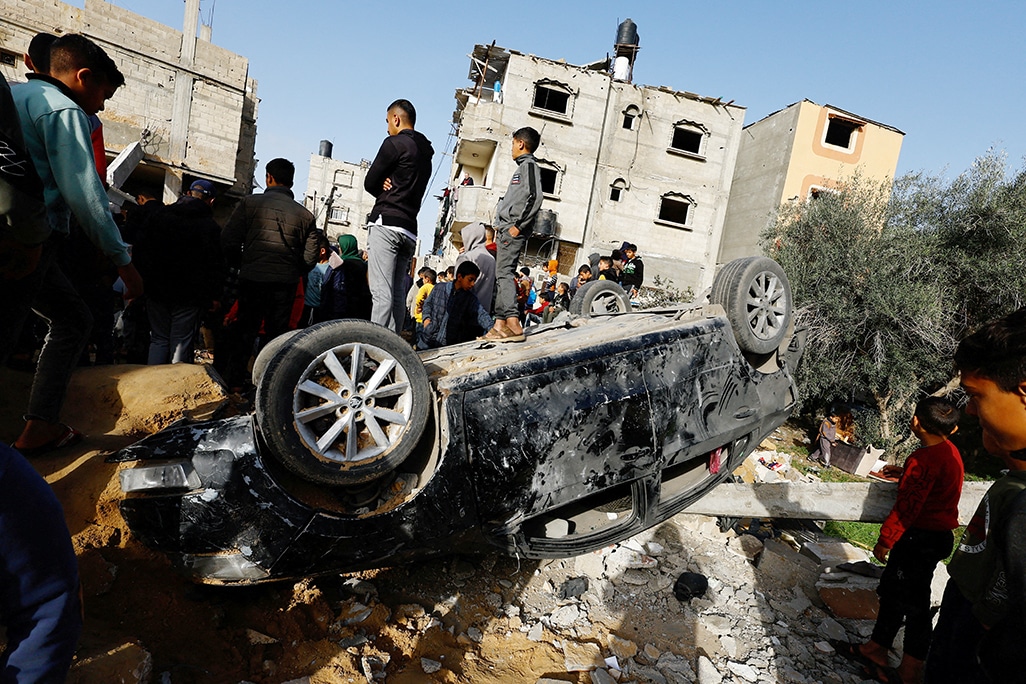Hamas and Egyptian mediators said on Monday they were pressing on with talks on securing a ceasefire in Gaza, despite an Israeli decision not to send a delegation.
The ceasefire talks, which began on Sunday in Cairo, are billed as a final hurdle to establish the first extended ceasefire of the five-month-old war, in time for the Ramadan Muslim fasting month which is expected to begin on Sunday.
Israel has declined to comment publicly on the Cairo talks, including its decision not to attend. A source had told Reuters Israel would stay away because Hamas refused a request to list which hostages are still alive, information the Palestinian militants say they will provide only once terms are agreed.
“Talks in Cairo continue for the second day regardless of whether the occupation’s delegation is present in Egypt,” a Hamas official told Reuters on Monday.
Two Egyptian security sources said mediators were in touch with the Israelis, allowing negotiations to continue despite the delegation’s absence.
A second Palestinian source close to the talks said the discussions remained “uneasy”, with Israel sticking to its demand for only a temporary truce to free hostages, while Hamas was seeking assurances war would not start up again.
Washington, which is both Israel‘s closest ally and a sponsor of the talks, says a deal remains close, with an agreement already effectively approved by Israel and only awaiting acceptance from Hamas.
“Hamas claims it wants a ceasefire. Well, there is a deal on the table. And as we have said, Hamas needs to agree to that deal,” Vice President Kamala Harris said on Sunday.
She also signalled an apparent hardening of tone from President Joe Biden’s administration towards its ally, using unusually forceful language to urge Israel to alleviate the “inhumane” conditions.
“The Israeli government must do more to significantly increase the flow of aid. No excuses,” she said.
In a sign of the strain between the Biden administration and the right-wing Israeli government of Prime Minister Benjamin Netanyahu, Harris was due on Monday to host Benny Gantz, a longtime political rival of Netanyahu who joined his war cabinet in a national unity pact at the war’s start. Netanyahu has not been invited to Washington since returning to office a year ago.
The proposal being discussed is for a truce of about 40 days, during which militants would release around 40 of the more than 100 hostages they are still holding in return for some 400 detainees held in Israeli jails.
Israeli troops would pull back from some areas, more humanitarian aid would be allowed into Gaza, and residents would be permitted to return to abandoned homes.
But the deal does not appear to address directly a Hamas demand for a clear path to permanently ending the war. Nor does it resolve the fate of more than half the remaining hostages – Israeli men excluded from both this and earlier agreements covering women, children, the elderly and the wounded.
Israel says it will not end the war until Hamas is eradicated. Hamas says it will not free all its hostages without a deal that ends the war.
The Egyptian security sources said mediators were trying to bridge the gap with guarantees to Hamas on future peace talks, and to Israel on the safety of hostages.
A Palestinian official close to the negotiations disputed the U.S. contention that Israel had already agreed to the deal and Hamas was holding it up, saying this appeared aimed at deflecting blame from Israel should the talks collapse.
“The Palestinian resistance, led by Hamas, has shown the flexibility needed, but at the same time they are determined to defend their people,” the official said.
RAFAH STRIKE KILLS FAMILY
The Gaza war erupted after Hamas fighters who control the enclave burst into Israel on Oct. 7, killing 1,200 people and abducting 253 hostages, according to Israeli tallies.
Since then, Israel has sealed off the coastal strip, stormed most of its towns and pounded it from the sky. Palestinian authorities say more than 30,000 people have been confirmed killed, most of the population has been made homeless, and the United Nations says hundreds of thousands of people face famine.
A Ramadan truce would head off a threatened Israeli assault on Rafah, the last town on the southern edge of Gaza, where more than half the enclave’s population are now sheltering.
But the final days leading up to it have been particularly bloody. Residents have described heavy fighting since Saturday just north of Rafah in Khan Younis, where Israeli forces have released video showing buildings obliterated in airstrikes.
In Rafah, airstrikes have been killing families in their homes nightly. At least 14 corpses were laid out at a hospital morgue in Rafah on Monday morning. One of the body bags was partially unzipped so weeping relatives could stroke the hair of a dead child.
“I woke up to people collecting bodies. I don’t remember anything,” wept Nidal al-Gharib, whose wife was among the dead.
Violence has also surged in the Israeli-occupied West Bank, where the Palestinian Authority that lost control of Gaza to Hamas in 2007 exercises limited self-rule. Israeli forces launched their biggest raid for years into the PA’s administrative capital Ramallah overnight, killing a 16-year-old in a refugee camp, Palestinian sources said.
Israel‘s Channel 14 News reported that several officers in the military spokesperson’s unit were leaving, which it called unusual at a time of war. The military denied chief spokesperson Rear-Admiral Daniel Hagari had quit, but did not directly comment on reports of other officers leaving.







Click here to change your cookie preferences